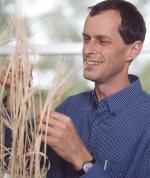Why the world needs GM crops
 Science Science
Adelaide has a major role to play in the development of salt-tolerant crops that could potentially feed millions of starving people worldwide. According to statistics, world food grain production must be doubled by the year 2050 to meet the demands of a growing global population. "Even under ideal conditions, it would be difficult to increase crop production much beyond current levels," said Professor Mark Tester, Australian Research Council (ARC) Federation Fellow at the University of Adelaide. Based at the Australian Centre for Plant Functional Genomics at the Waite Campus, Professor Tester is a key researcher in international efforts to turn the tide of crop production. "With the greatest population increases being in the cities of developing countries, it is an economic necessity that the majority of any increased food production should occur in the countries in which these growing cities are located," he said. "Most crop-growing conditions are far from ideal. Particularly challenging is that increased production must be achieved in the face of decreased land area for cropping, diminishing water resources and worsening environmental constraints, such as drought and poor soil. "There are both practical and theoretical constraints which limit just how much a plant can do!" Globally, cereal production is reduced by approximately one-third due simply to the effects of drought, salinity and low temperatures, Professor Tester said. "The difference between the potential yield and that actually achieved is termed the 'yield gap'. Most practical increases in global food production will occur through the closing of this yield gap. In other words, we need to develop crops, particularly the cereals, that will be more tolerant to the so-called 'abiotic stresses', notably drought, salinity and low temperatures." Abiotic stresses are a problem not only in developing countries. "The devastating effects of drought and salinity both on the environment and on the farmers of Australia are all too apparent. Only two years ago, national wheat production plummeted from 24 million down to nine million tonnes as a result
of drought. "A recent market analysis of cropping identified drought and poor soil conditions (mainly salinity) as the two most significant factors limiting the yield of cereal crops in Australia. Salinity alone is estimated to be costing the Australian wheat industry $1.3 billion annually. There is a clear imperative to improve the tolerance of our crops to the harsh environmental conditions that are prevalent in Australia," he said. The research underway in Professor Tester's laboratory is focused on increasing the tolerance of crops to saline soils. "Central to this work is the stark observation that some plants manage to keep growing well on saline soils (tough plants), whereas others grow poorly (the wimps). We're identifying genes that make the tough plants tough, and then moving these genes into the wimps, in order to toughen up the wimps. "The toughness genes may be derived from plants that are closely related to the crops we want to make more tolerant, or else they may be found in more evolutionarily distant plants, that display tolerance to greater extremes than do the crop relatives." It is not only the presence of a particular gene that is important, but also where in the plant the gene is activated, and when the gene is activated. It is these cell-specific genetic issues that are a major focus of the research program in Professor Tester's laboratory. "With the new developments in biology that exploit the power of robotics and computing, extraordinary and exciting new advances are now possible," Professor Tester said. "In large centres such as the Australian Centre for Plant Functional Genomics and the Waite campus of the University of Adelaide, there is now a critical mass of researchers who have the chance to make significant breakthroughs in plant science and crop improvement. We live in exciting times." Story by David Ellis
|





